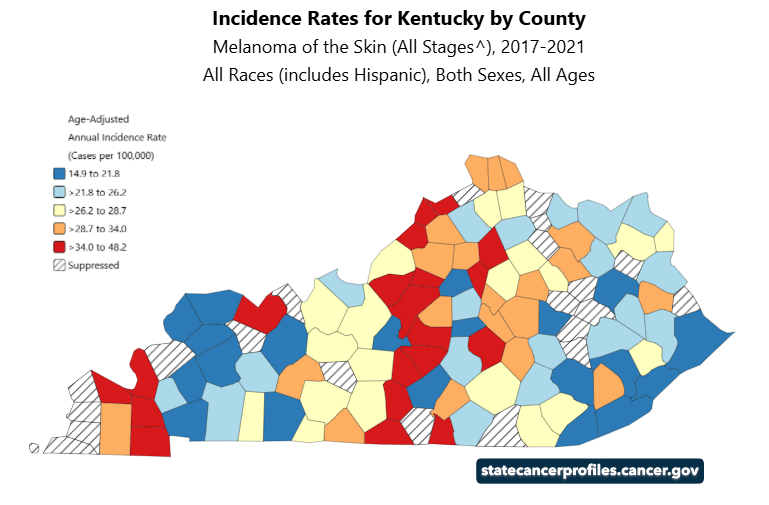Tips on skin cancer prevention, water safety and heat protection

By Melissa Patrick
Kentucky Health News
With the first official day of summer behind us, it’s time to think about how to stay safe from some of the health risks that come from spending time in the great outdoors.

“Summer is a time for fun and relaxation, but it’s also a season when health risks increase,” Dr. Benjamin Neltner, a family medicine physician with Saint Joseph Medical Group – Primary Care, said in a news release. “Taking a few simple precautions – like using sunscreen, staying hydrated and watching kids closely around water – can make all the difference. Staying safe means you and your family can enjoy everything summer has to offer without unnecessary risks.”
Protection against skin cancer
Skin cancer is the most common form of cancer in the United States, with millions of new cases diagnosed each year. Kentucky ranks seventh among states for the rate of new melanomas (28.2 cases per 100,000 people), higher than that of the United States (22.9 per 100,000).
Some Kentucky counties have even higher rates, with Nelson, Marion, Green and Taylor counties having rates over 40 cases per 100,000 people, according to county data provided by the National Cancer Institute.
Exposure to ultraviolet rays from the sun is the main risk factor for skin cancer.
Anyone can get skin cancer, regardless of their skin color, but the risk is greatest for people with fair or freckled skin, light skin and blond or red hair. Other risk factors include having a family history of skin cancer, having certain types of moles and having a history of sunburns or tanning.
Tips to protect your skin from the sun:
- Sunscreen: Use a broad-spectrum sunscreen with an SPF of 30 or higher, and remember to reapply it every two hours, or more frequently if you’re swimming or sweating.
- Hats and clothing: Wearing protective clothing, such as long sleeves, wide-brimmed hats, and UV-blocking sunglasses, also helps shield your skin from harmful rays.
- Avoid peak sun hours: Try to avoid direct sun exposure between 10 a.m. and 4 p.m.
- Perform monthly skin self-exams: Check for any unusual spots or changes to your skin monthly, and schedule an annual skin examination with your health care provider.
“Even a few bad sunburns, especially in childhood or adolescence, can significantly increase your risk of developing skin cancer later in life,” said Neltner. “The good news is that skin cancer is one of the most preventable types of cancer. Prevention starts with simple daily habits – like applying sunscreen every morning, wearing protective clothing, and being mindful of your time in the sun. By taking these steps consistently, you can enjoy the outdoors while protecting your long-term health.”
Water safety
Drowning is the leading cause of unintentional death among children ages 1 to 4 and remains a serious risk for people of all ages.
Tips to keep kids safe in and around the water:
- Always supervise children closely when they are near water, and avoid any distractions while doing so.
- Enroll children in age-appropriate swimming lessons to build their confidence and water skills.
- Always wear a life jacket when boating or swimming in open water, regardless of your swimming ability.
- At home, ensure pools are secured with barriers such as fences with self-latching gates
- Learn CPR to be prepared in case of an emergency.
Prevent heat-related illness
High summer temperatures can pose serious health risks, especially for older adults, young children and people with chronic medical conditions.
Heat-related illnesses happen when the body isn’t able to properly cool itself, and can range from milder conditions (fainting, dizziness, heat rashes and cramps) to heat exhaustion. The most serious heat-related illness is heat stroke.
The CDC says one of the main things that affects a person’s ability to cool down during hot weather is high humidity. When the humidity is high, sweat doesn’t evaporate as quickly as it normally does, and it’s the evaporation that keeps us cool.
Tips to protect against heat-related illness:
- Drink plenty of water throughout the day – don’t wait until you feel thirsty.
- Try to remain indoors during the hottest parts of the day, typically between late morning and early evening.
- When outside, wear lightweight, light-colored clothing to help your body stay cool.
- Never leave people or pets in parked vehicles, as temperatures can rise to dangerous levels in just minutes.
- Be aware of the warning signs of heat-related illness, including heavy sweating, weakness, confusion, dizziness, and nausea. If any of these symptoms occur, seek medical attention immediately.
Neltner also provided some other summer safety tips:
- Use insect repellent to protect against bugs and ticks, and always check for ticks after spending time outdoors.
- Practice proper food safety by keeping cold foods chilled and hot foods properly heated to reduce the risk of foodborne illnesses.
- And, to stay hydrated.